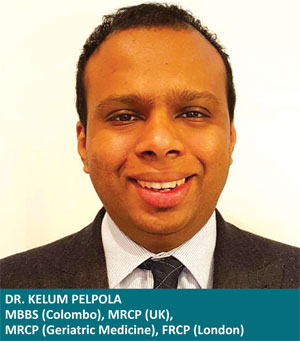AN INTERVIEW WITH DR. KELUM PELPOLA
Caring for the elderly involves addressing a wide range of physical, emotional, and mental health challenges. As life expectancy increases, the number of older individuals requiring specialized medical care grows exponentially. Among these, mental health issues, including confusion, memory decline, depression, and anxiety, are common yet often misunderstood. Geriatric medicine—a specialized field focused on the healthcare of older adults—is instrumental in addressing these challenges comprehensively. In this illuminating interview with Dr. Kelum Pelpola, a leading expert in geriatric care, we explore how this branch of medicine improves the mental healthcare of the elderly, offering insights into conditions like delirium, dementia, depression, and anxiety.
UNDERSTANDING CONFUSION IN THE ELDERLY
Q: Confusion and memory issues are prevalent among older individuals. How can one differentiate between their underlying causes?
Dr. Pelpola: Confusion in the elderly can arise due to various reasons. The first step is to determine if it has a sudden onset—developing over a few days or weeks—or if it’s a long-term issue. Sudden confusion is often referred to as delirium, whereas long-term memory issues could indicate dementia.
Delirium, a condition involving an altered level of consciousness, can be triggered by infections, electrolyte imbalances (like low sodium), low thyroid hormone levels, or other metabolic disturbances. Something as seemingly simple as a urinary tract infection or the flu can provoke delirium in older adults. This occurs because aging often weakens the immune system, making typical symptoms of infection less apparent. For instance, an older adult with a urinary infection might not experience fever or pain but could exhibit behavioral changes indicative of delirium. Recognizing these atypical signs is crucial for timely intervention.
Q: Can you explain the types of delirium?
Dr. Pelpola: Delirium is broadly categorized into two types: hypoactive and hyperactive. In hypoactive delirium, individuals become less responsive, lethargic, and disengaged. Conversely, hyperactive delirium manifests as heightened agitation, aggression, or fearfulness. Both types reflect an acute deviation from an individual’s baseline behavior and should prompt immediate medical attention.
UNPACKING DEMENTIA: GRADUAL MEMORY DECLINE
Q: How does dementia differ from delirium?
Dr. Pelpola: Dementia unfolds gradually over months to years, characterized by a persistent decline in cognitive functions. Unlike delirium, dementia does not fluctuate rapidly. A hallmark of dementia is the loss of short-term memory while retaining older memories. For instance, a person might remember school events vividly but struggle to recall what they had for breakfast.
Another early sign of dementia is difficulty navigating new environments, such as getting lost in a small supermarket. This contrasts with normal forgetfulness and serves as an early warning for families to seek medical advice.
TYPES OF DEMENTIA
Q: Could you elaborate on the types of dementia?
Dr. Pelpola: The most common type is Alzheimer's dementia, associated with brain atrophy due to wear and tear. Another prevalent form is vascular dementia, often linked to strokes or small vessel disease—a condition where tiny blood vessels supplying the brain become damaged or blocked.
Some individuals develop Parkinson’s-related dementias, which occur as the disease progresses. Additionally, there are mixed dementias, where features of both Alzheimer’s and vascular dementia coexist. These distinctions are crucial for tailoring treatment approaches.
Q: Depression and anxiety are becoming more common in the elderly. What contributes to this trend?
Dr. Pelpola: Depression and anxiety in older adults have worsened in recent years, largely due to societal changes. Many elderly individuals live alone as families migrate for economic reasons, leaving them isolated. This loneliness, compounded by reduced social interactions post-COVID-19 and during economic crises, significantly impacts their mental health.
Symptoms of depression in the elderly include low mood, loss of appetite, sleep disturbances, and disinterest in previously enjoyable activities. Anxiety often presents with physical symptoms like palpitations, shortness of breath, or gastrointestinal discomfort, exacerbated by prolonged solitude.
PREVENTING COGNITIVE DECLINE
Q: Are there ways to prevent or slow cognitive decline in the elderly?
Dr. Pelpola: While dementia cannot be reversed, certain strategies can help optimize memory and cognitive function. For example:
Simple efforts like these can improve mental health and reduce the risk of depression and anxiety.
Dr. Pelpola: Consistent communication is key. If family members are abroad, daily video or phone calls can help maintain a sense of connection. Encouraging elderly individuals to talk about their day or share experiences keeps their minds active. Visits from friends or relatives, even once or twice a week, provide much-needed social interaction. Additionally, fostering interactions with grandchildren or arranging visits from friends can enhance their emotional well-being.
THE ROLE OF GERIATRIC MEDICINE
Q: How does geriatric medicine address these mental health challenges?
Dr. Pelpola: Geriatricians take a holistic approach, addressing both physical and mental health issues. For instance:
By addressing the elderly person’s overall health, geriatricians prevent complications and promote well-being.
THE HOLISTIC APPROACH OF GERIATRIC MEDICINE
Q: What sets geriatric medicine apart from other specialties?
Dr. Pelpola: Geriatricians prioritize a holistic view, treating the patient as a whole rather than focusing solely on isolated problems. This comprehensive care ensures that mental health interventions align seamlessly with treatments for physical conditions. For example, monitoring sodium levels when prescribing antidepressants minimizes complications. Such integrated care makes geriatric medicine uniquely equipped to manage the multifaceted health issues of older adults.
Mental health issues in the elderly are often overlooked but deeply impactful. With geriatric medicine’s emphasis on holistic care, these challenges can be effectively addressed. Dr. Pelpola’s insights underscore the importance of early intervention, regular social interaction, and comprehensive medical care in improving the mental healthcare of older adults. Families, caregivers, and medical professionals must collaborate to ensure the elderly lead fulfilling, dignified lives.
Leave Comments